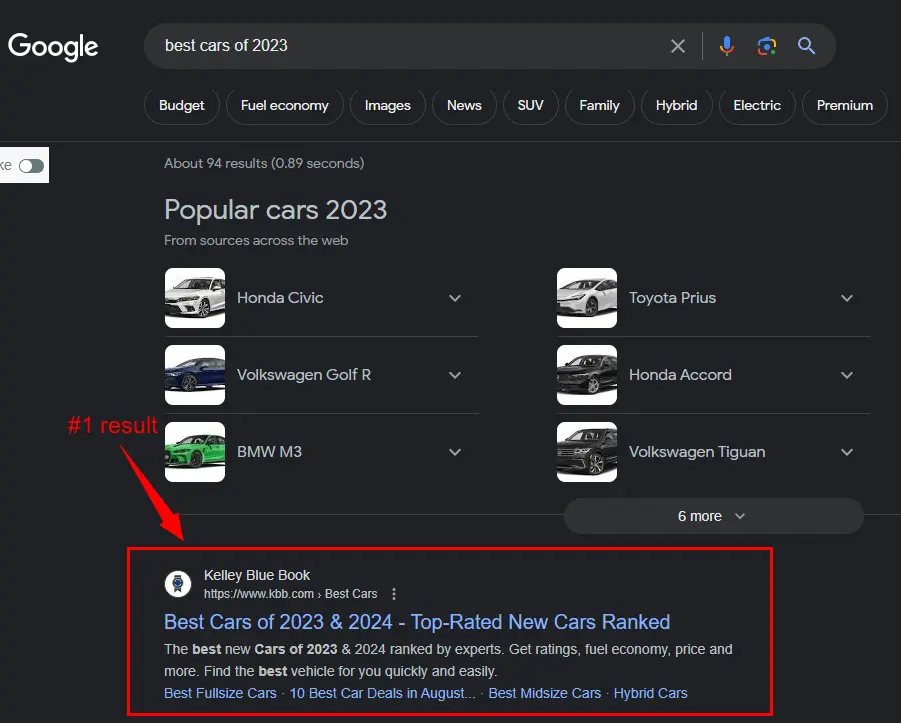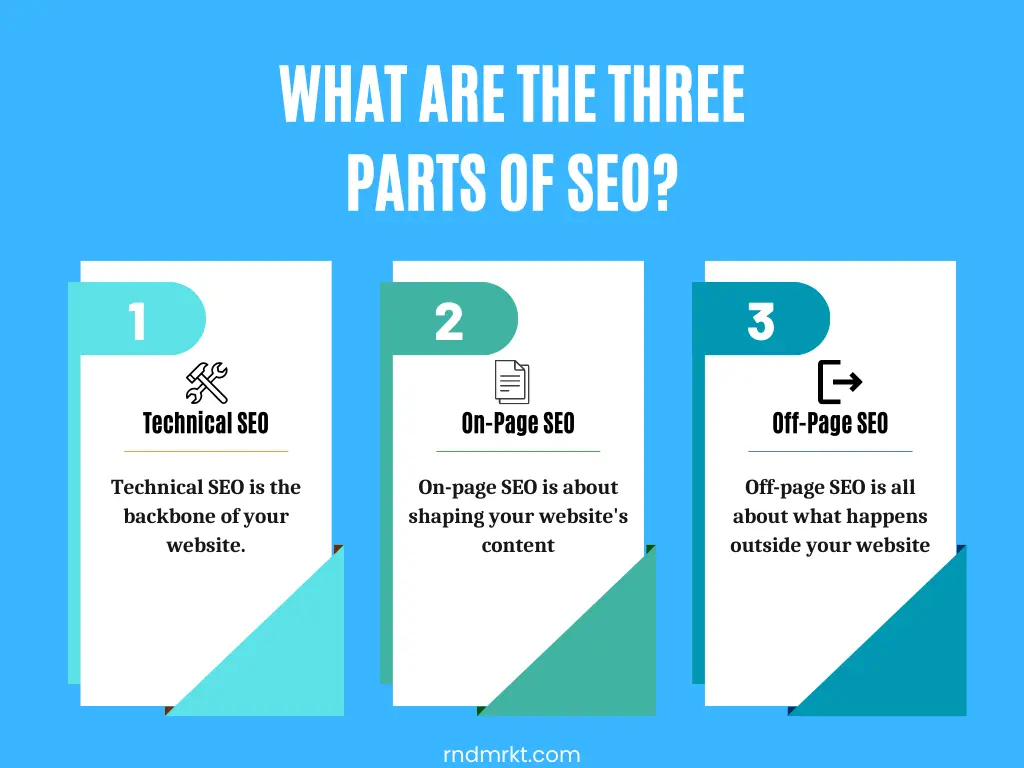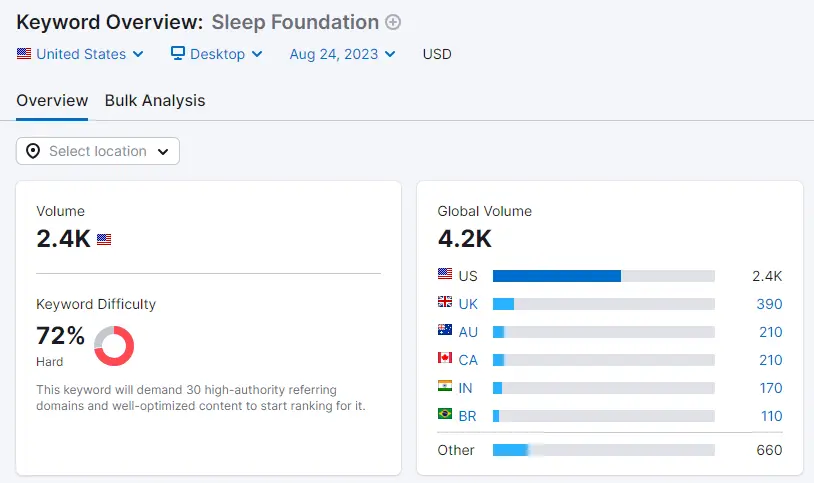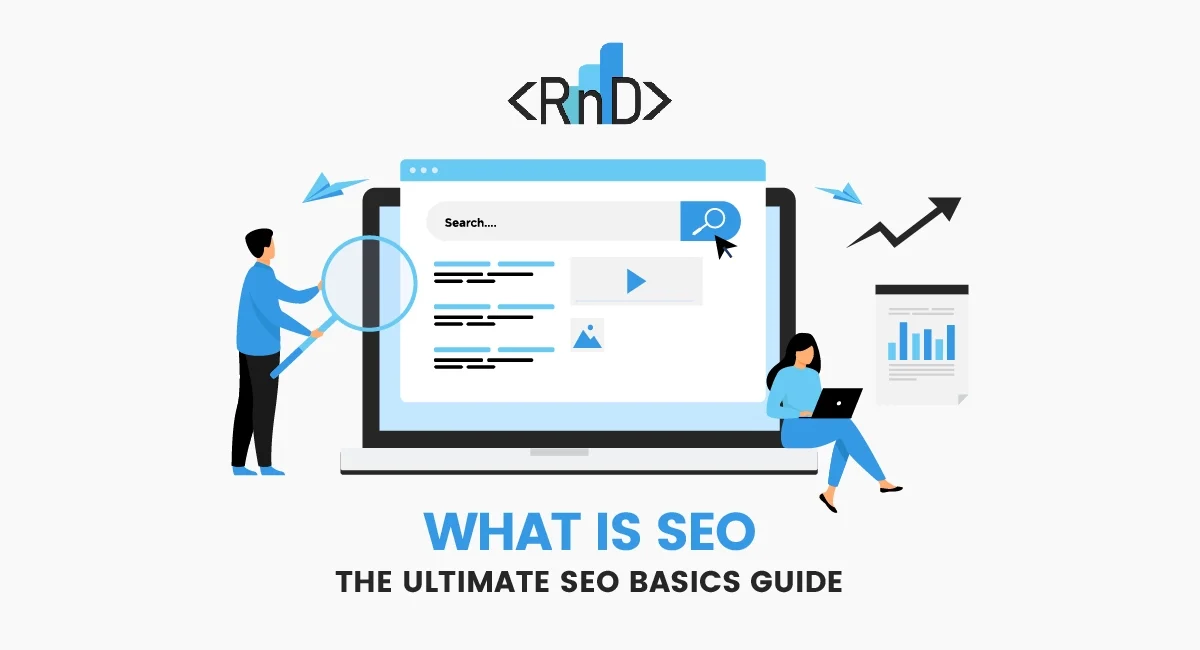Ever wonder why some websites always top the search results? That’s SEO, or Search Engine Optimization, at work. It’s a key marketing channel that helps websites become more visible online. In this guide, we’ll explore what SEO is, how it works, how it’s different from other online marketing methods, and why it’s so important for businesses today. Whether you’re new to SEO or want to learn more, this is the place to start!
What are we going to cover today?
What Exactly Is SEO?
SEO stands for Search Engine Optimization. Think of it like a set of rules or a roadmap that helps websites show up higher in the list when someone searches for something online. The better the SEO, the more likely a website will be near the top of the search results.

Why does this matter? When your website appears closer to the top, more people are likely to click on it. That means more visitors, which can lead to more customers or fans of your blog, store, or whatever else you have on your website. In short, SEO helps people find you more easily online.
SEO vs. Other Digital Marketing Channels
Digital marketing is an ever-changing field, with various strategies to reach different goals. SEO, or Search Engine Optimization, is one crucial tool among them. But how does SEO stack up against other digital marketing channels? Let’s break it down a bit.
1. SEO vs. Social Media
Social media platforms help connect with your audience, while SEO makes sure people find you when they search online. While social media focuses on engagement and building relationships, SEO emphasizes getting your website higher in search results. Both aim to increase visibility, but they do so in different ways.
Social media relies on sharing and interaction, which may require the expertise of a social media agency or social media professional services to manage effectively. On the other hand, SEO uses keywords, quality content, and other techniques to attract users from search engines. By understanding the roles and potential collaboration between social media experts and SEO practices, businesses can leverage the unique strengths of each to build a more comprehensive and effective online presence.
2. SEO vs. Email Marketing
Email marketing is like sending personalized invitations to people you already know. It’s a direct way to share news, offers, or updates with customers who have already shown interest. SEO, on the other hand, is like putting up billboards where new people can see them. It helps potential customers find you when they’re searching for something you offer.
While usually email marketing talks to an existing audience, SEO tries to expand your audience by reaching new prospects. They serve different purposes but can be powerful when used together. Email can keep current customers engaged, while SEO can bring in fresh faces. Together, they can create a dynamic duo that helps your business grow, both by “nurturing” existing relationships and by forging new connections online.
3. SEO vs. PPC
When comparing SEO and PPC, it’s like looking at two different paths to reach the same destination: online visibility. Each has unique benefits and trade-offs.
SEO is a method to improve your natural ranking in search results. It’s like planting a garden; it requires time, patience, and continuous care to grow. The results may take time, but they’re often lasting and can be more cost-effective in the long run.
PPC, on the other hand, is like buying a ticket to the front row. You pay for advertising space at the top of search results, and the visibility is immediate. It can bring quick results, but it’s a continuous investment. The moment you stop paying, the visibility drops back to 0.
4. SEO vs. Affiliate Marketing
SEO and affiliate marketing serve different functions within a brand’s online strategy. SEO is all about making your brand’s website more visible in search results. It’s a way to attract more visitors without paying commissions. Using the right keywords and quality content, you work to climb the search rankings.
Affiliate marketing, on the other hand, is about having others promote your products. You pay them a commission for each sale made through their unique affiliate links. They help spread the word, and you reward them for the sales they bring in.
Can Affiliate Marketing and SEO Work Together?
If your SEO is strong, your brand becomes more known and attractive to potential affiliates. They may even start seeking you out, drawn to your growing online reputation. Strong SEO can make your affiliate program more appealing, attracting quality affiliates who can further boost your brand. Meanwhile, investing in affiliate marketing can increase your sales and broaden your reach.
By leveraging both SEO and affiliate marketing services, you can create a synergistic effect that helps grow your brand online.
Types & Parts of SEO
SEO (Search Engine Optimization) is categorized into three main types:
- Technical SEO: This is the groundwork for a website, focusing on its structure.
- On-site SEO: Deals with content and how it’s presented to both search engines and users.
- Off-site SEO: Focuses on strengthening your website’s reputation and relationships with other websites.

Below, we’ll dive deeper into these categories.
1. Technical SEO
Technical SEO is the backbone of your website. Think of it as constructing a solid foundation for your house. It’s about building an error-free, efficient structure where all the other elements can stand firmly. Without Technical SEO, no matter how eye-catching your content or off-site strategies are, everything might fall apart.
Technical SEO is used before the website is even live. We utilize the best practices to create an efficient roadmap for the new website, including URL structure and more.
- Website Architecture: Ensures your site can be easily crawled and indexed by search engines. It’s like constructing clear roads and pathways to different parts of a city.
- User Experience: Focuses on quick page loading, mobile-friendliness, and user-centric design. Imagine a clean, well-organized store where everything is easy to find.
- Structured Data: Uses special codes to make it easier for search engines to understand what your content is about, much like labels on products in a store help shoppers know what they’re buying.
- Hosting, CMS, and Security: Selecting the right hosting service, a secure content management system, and implementing site security.
- Core Web Vitals: Ensuring positive interaction experiences like loading speed, interactivity, and visual stability. Take a look at this Core Web Vitals case study.
- Mobile Optimization: Making sure your website looks and functions well on mobile devices is important.
- HTTPS: Using secure protocols gives confidence to your visitors, much like knowing your home has a robust security system.
2. On-page SEO
On-page SEO is about shaping your website’s content and structure to be both user-friendly and search engine-friendly.
- Content for People: Your content should be interesting, relevant, unique, and free of errors. This includes multimedia such as images or videos.
- Content for Search Engines: Optimize elements like title tags, meta descriptions, headers, and image alt texts.
- Website Structure: Creating a clear navigation and URL structure, so users and search engines can easily find and understand your content.
- Internal Linking: Connecting related pages within your site helps users find more of what they are looking for, much like references in a book guide you to additional information.
- Social Sharing Integration: Providing simple tools and buttons that allow users to share your content on social media platforms.
On-site SEO makes your website like a well-organized library. It’s easy for readers to find what they’re looking for and easy for search engines to understand too.
3. Off-Page SEO
Off-page SEO is all about what happens outside your website to boost its online visibility. This section covers essential tactics like link building, content marketing, local SEO, reviews, and events, helping you extend your reach and improve your rankings.
1. Link Building: Link building is all about getting other websites to link to your site. You want to focus on:
- Authority: Aim for high-authority websites as they can help you rank higher. Don’t ignore low-authority sites, though; they won’t harm your SEO.
- Unique Domains: Focus on getting links from as many relevant, quality domains as possible, as this can correlate with higher rankings.
2. Content Marketing: This is a broad off-page SEO strategy, including:
- PR: Great for earning authoritative links and increasing brand awareness.
- Social Media: Not a direct ranking factor but helps in getting attention and possibly more links.
- Influencer Marketing: Collaborate with popular creators to reach new audiences.
- Guest Posting: It’s an effective way to get your brand in front of a different audience and secure mentions and backlinks.
- Podcasts: Utilize them for backlinks and reach new audiences.
- Content Syndication: Republish content on various platforms but be careful with Google’s syndication rules.
- Forums: Get involved in relevant discussions to build relationships and trust.
3. Local SEO: This focuses on increasing local traffic and visibility.
- Google Business Profile: Optimize your listing for better local visibility.
- NAP Citations: Ensure consistency in your business’s name, address, and phone number across online references.
4. Reviews: Reviews build trust and are crucial for your local SEO success. Respond to all reviews, and never exchange money for them.
5. Events: Hosting events can create a buzz around your business, driving social engagement and links.
Now that we understand how SEO works and what it is, it’s time to explain what are the main three main reasons you should incorporate SEO into your marketing operations.
Why Invest in SEO?
SEO, or Search Engine Optimization, is a crucial part of any successful online strategy. Here’s why it’s a wise investment:
Reason #1: Long-Term ROI
Investing in SEO is not about quick wins; it’s a long-term strategy. With consistent efforts in quality content, link-building, and following best practices, you can see a substantial return on investment. Unlike paid ads, the results of effective SEO last beyond your immediate campaign, continuing to draw traffic and potential customers to your site over time.
Reason #2: Boosting Organic Traffic and Conversion Rates
SEO isn’t just about attracting more visitors; it’s about attracting the right visitors. By targeting specific keywords and crafting valuable content, you can reach your target audience. These visitors are more likely to be interested in your product or service, leading to higher conversion rates. This organic traffic, once established, becomes a steady source of potential customers.
Take a look at this example of a company we used to work for (before we started RnD Marketing). Pay attention to the increase in ranked keywords starting from Jan 2022.

Reason #3: Enhancing Brand Authority
A strong SEO strategy isn’t just about search engine rankings; it’s about establishing your brand as an authority in your field. When your site appears at the top of search results, users see your brand as trustworthy and knowledgeable. Quality content, backlinks from reputable sites, and a consistent online presence all contribute to this perception.
Investing in SEO helps build your brand’s reputation, making customers more likely to choose you over competitors. In addition, as you become more popular, you will notice an increase in branded traffic. Take a look at the example of the brand below, which has 4,200 monthly brand name searches on Google!

We have covered all the good stuff and important things to know, but what about the difficulties and challenges that SEO can bring up? let’s discuss those now.
Challenges and Solutions in SEO
SEO is a dynamic field with its own set of challenges and rewards. Let’s explore some common obstacles and how to overcome them:
Overcoming Algorithm Changes
Search engine algorithms change frequently, impacting SEO efforts. Staying updated on these changes is key, so regular check-ins with reputable SEO sources and the official Google Search updates status are essential. Adjust your strategy to align with current best practices and always focus on quality content. Avoid shortcuts and gaming the system, as algorithms are designed to reward genuine, valuable content. By staying informed and flexible, you’ll keep your SEO strategy effective.
Visit our blog for information about updates and different SEO-related guides and news.
Fighting Against Black Hat SEO Practices
Black Hat SEO is when competitors use the wrong methods to gain an edge, but it’s a risky path. They may benefit for a short time, but Google usually catches and punishes these actions. Recovery from this penalty is often very difficult, if not impossible. Instead of risking your site’s reputation, focus on ethical SEO practices (such as those mentioned in this article), keep an eye on your site, and stay on the right side of the rules. That’s the way to build long-term success.
Avoiding Common SEO Misconceptions
Misunderstandings about SEO are rampant, and falling for these misconceptions can harm your strategy. Some popular myths include:
- “SEO is a one-time task”: SEO requires continuous effort and updates.
- “Keyword stuffing boosts rankings”: This outdated tactic can actually hurt your site.
- “All backlinks are good”: Quality matters more than quantity.
- “Use the exact search keyword in the content”: If the exact search keyword isn’t grammatically correct, never do it. You are writing content for people, plus search engines are much more advanced than in the past.
Investing in continuous education, trusting only credible sources, and focusing on proven, ethical methods can help you avoid these common pitfalls. This way, you’ll align your strategy with practices that actually work, rather than quick-fix solutions that can lead to failure.
SEO in Various Industries and Fields
SEO varies significantly across different industries. From online marketplaces to community-driven local businesses, and non-profit organizations, each requires a unique strategy. In this section, we’ll explore how SEO can be tailored to meet the specific needs of these different fields, helping you navigate the complexity of optimizing your presence, no matter your industry.
E-commerce SEO Strategies
SEO in e-commerce isn’t just about keywords; it’s about specific tactics that fit the online retail environment. Here’s a simple table of actionable items uniquely suited to e-commerce sites:
| Actionable Item | Purpose |
|---|---|
| Use Canonical Tags | Prevent duplicate content issues |
| Optimize Product Descriptions | Make products easily searchable |
| Implement Structured Data Markup | Enhance search result appearance |
| Focus on Mobile Optimization | Adapt to shopping on various devices |
By employing these strategies, you can make your e-commerce site more user-friendly and discoverable in search engines, leading to increased sales and visibility. Of course, there are other interesting actions you can take, but we will cover those in more depth in the future.
Local Business Optimization
Local SEO is all about connecting with your community and making your business easy to find for those nearby. Here’s a straightforward table of actionable items tailored to local businesses:
| Actionable Item | Purpose |
|---|---|
| Keep NAP Info Accurate | Consistency across all listings |
| Collect Positive Reviews | Build trust and reputation |
| Optimize Google My Business (GMB) | Enhance local search visibility |
| Use Local Keywords | Target community-specific searches |
| Use local business directories | Increase the business relevancy for that area |
Focusing on these areas will help local customers find you quickly and easily, whether they’re looking online or in the neighborhood.
SEO for Non-Profit Organizations
Non-profit organizations have unique SEO needs, focusing on mission-driven content and community engagement. Here’s a table of actionable strategies tailored for non-profits:
| Action | Description |
|---|---|
| Optimize Mission Content | Focus on content that highlights your mission and goals. Use relevant keywords to connect with those interested in your cause. |
| Build Quality Backlinks | Create relationships with like-minded organizations and websites. Backlinks can enhance credibility and visibility. |
| Tell Compelling Stories | Share real stories of impact. This not only resonates with supporters but also helps in SEO by creating engaging and shareable content. |
| Connect Online | Engage with supporters on social media and forums. This community connection can help spread awareness and support SEO efforts. |
By implementing these strategies, non-profits can increase awareness and foster support, aligning their online presence with organizational goals.
Crafting and Executing an Effective SEO Plan
Crafting an effective SEO plan is a multifaceted process that requires a deep understanding of your target audience, clear goals, and strategic implementation. Whether you’re a small business owner, a marketer, or an SEO specialist, understanding the key components and how they work together is essential for success. In this section, we’ll break down content strategy and creation, link-building techniques, and performance metrics and KPIs.
1. Content Strategy and Creation
Content is at the heart of SEO. It’s what attracts and engages your audience, and it’s crucial for building trust and authority in your field. Here’s how to get started:
- Identify Target Audience: Understanding who your target audience is helps in creating content that resonates with them. Look at demographics, interests, and pain points.
- Create Quality Content: This involves writing informative, engaging content that offers real value and answers questions your audience may have.
- Utilize Relevant Keywords: Research and use keywords that your target audience is likely to search for. These keywords should be natural and relevant to the content.
- Update Regularly: Search engines favor fresh content. Regularly updating and adding new content keeps your site relevant and can boost rankings.
2. Link Building Techniques
Links are like the backbone of your website in the eyes of search engines. Building quality links helps increase your site’s credibility:
- Analyze Competitor Links: Find out where your competitors are getting links and identify opportunities.
- Guest Post on Reputable Sites: Offer to write quality content for other reputable sites in your industry. Include a link back to your site.
- Use Internal Links: Internal linking helps in navigation and can boost the ranking power of other pages.
- Avoid Black Hat Techniques: Following ethical practices ensures that your site won’t be penalized.
3. Performance Metrics and KPIs
You can’t manage what you don’t measure. Understanding SEO performance metrics helps in assessing the success of your SEO efforts:
- Track Organic Traffic: This gives insights into how many visitors are finding your site through search engines.
- Measure Conversion Rates: Conversion rates show how many visitors are taking the desired action, like making a purchase or signing up for a newsletter.
- Monitor Keyword Rankings: Regularly monitor how your keywords are performing to understand where adjustments are needed.
- Assess Bounce Rates: High bounce rates can be a sign of irrelevant content or poor user experience. Analyzing this helps in making necessary improvements.
By combining the right content strategy with ethical link-building practices and continuous monitoring of performance, you can create an SEO plan that not only achieves but surpasses your goals. It’s a dynamic, ongoing process that requires attention, effort, and the willingness to adapt to the ever-changing landscape of SEO. But now that you have done all that, and you feel that you are set to go, what your future plans should include? Let’s see together.
Ongoing SEO: Beyond the Basics
SEO isn’t a set-it-and-forget-it strategy. Beyond the basics lies a world of continuous improvement, community engagement, and a focus on user experience. This is where the real magic happens, where relationships are forged, trust is built, and where your website’s true potential is unlocked. Let’s delve into the ongoing efforts that keep your SEO strategy sharp and effective.
Regular Audits and Adjustments
The digital landscape is constantly evolving, and your SEO strategy must adapt accordingly. Regular audits and adjustments ensure that your efforts are aligned with the latest trends and updates.
- Conduct Site Audits: Regularly check your website for broken links, slow loading times, and other issues that can affect rankings. You can use SEMrush for all those things.
- Analyze Keyword Performance: Keep tabs on how your chosen keywords are performing and make necessary adjustments.
- Evaluate Backlink Profile: Assess the quality and relevance of your backlinks, removing any that may be harming your reputation.
- Monitor Competitor Activity: Stay aware of what your competitors are doing in the SEO space, and tweak your strategy to stay ahead.
Engaging with Community Through SEO
Community engagement is about connecting with your audience, building relationships, and fostering trust. It’s a two-way street where SEO can play a vital role.
- Create Interactive Content: Polls, quizzes, and interactive graphics can engage your audience and encourage sharing.
- Respond to Comments and Reviews: Regularly interact with your community by responding to comments and reviews, showing that you value their input.
- Leverage Social Media: Use social platforms to share content, ask questions, and build relationships with your followers.
- Host Webinars and Live Events: Offering educational content through webinars and live events can establish you as an authority in your field.
SEO’s Impact on User Experience
SEO is more than just pleasing search engines; it’s about creating a smooth and enjoyable experience for your users.
- Optimize Page Load Speed: Slow pages frustrate users. Optimize images and code to ensure your pages load quickly.
- Ensure Mobile Responsiveness: More people are browsing on mobile. Make sure your site looks and works great on all devices. Pro tip: Check if your page is mobile-friendly with Google’s Mobile-Friendly Test.
- Implement Clear Navigation: A clear and intuitive navigation structure helps users find what they’re looking for with ease.
- Use High-Quality Images and Videos: Visuals can enhance user experience, but they must be of high quality and relevant to the content. You can work with Canva, or freelancers from Upwork to create custom images that match your brand and message.
Ongoing SEO is a commitment to excellence. It means regular fine-tuning, genuinely engaging with your community, and prioritizing user experience. It’s an investment in the future of your website, your brand, and ultimately, your success. It goes far beyond keywords and links; it’s about creating connections, delivering value, and continually striving to be better.
Don’t give up if you feel that you are not getting anywhere yet! SEO is about being consistent. Eventually, search engines will reward your dedication.
Conclusion: SEO is Your Long Game
SEO is a long-term commitment that goes far beyond the basics. It offers significant ROI, boosts your brand’s credibility, and provides a top-notch user experience. The landscape is always changing, but with the right strategies, you can stay ahead of the curve. If navigating the complexities of SEO feels daunting, we’ve got your back.
Our SEO consultancy services are designed to keep you on top of your game, from ongoing adjustments to performance analytics. Ready to make the most of what SEO has to offer? Let’s team up and make it happen.
Frequently Asked Questions
Expect at least 3-6 months for noticeable changes. However, SEO is a long-term game, and the best results often come after a year or more of consistent effort.
While basic SEO can be done in-house, for complex strategies and competitive markets, hiring an SEO specialist is recommended. They have the expertise to navigate algorithm changes and implement advanced techniques.
Both are crucial. On-page SEO focuses on content and website optimization, while off-page SEO is about building quality backlinks and social signals. We do recommend focusing on on-page SEO first, as often it can result in an organic improvement of the off-page.
Local SEO is specifically aimed at improving your business’s visibility in local search results. This includes optimizing for location-based keywords and managing your Google My Business account.
Yes, backlinks are still a major ranking factor. However, focus on quality over quantity. Links from reputable, high-traffic sites are much more beneficial than numerous low-quality links. Avoid buying links as it’s a violation of Google’s spam policies.





